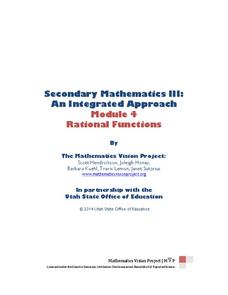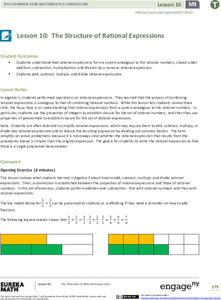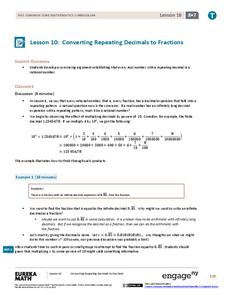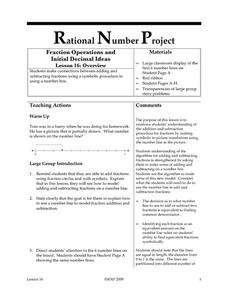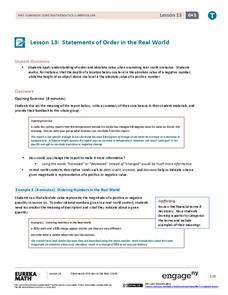EngageNY
Writing and Interpreting Inequality Statements Involving Rational Numbers
Statements often have multiple interpretations — but not these inequality statements. Scholars compare rational numbers and write inequality statements symbolically. The lesson includes problems that require comparing three numbers.
EngageNY
Comparing Integers and Other Rational Numbers
The ninth installment of a 21-part module has pupils compare integers and rational numbers in decimal and fraction form. They match stories to number lines and compare values in the stories.
EngageNY
Rational Numbers on the Number Line
Individuals learn how to plot rational numbers on the number line in the sixth lesson of a 21-part module. They identify appropriate units and determine opposites of rational numbers.
Curated OER
Rational Number Project
Infuse your unit on fractions, decimals, and operations with a thorough module about rational numbers. With a teaching guide, learner examples, templates for instruction, and lesson rationale, the module is a solid way to...
EngageNY
The Decimal Expansion of Some Irrational Numbers
Develop a definition of irrational numbers through an exploration of square roots. The 11th lesson in this series of 25 asks scholars to estimate the value of a square root. Learners observe as the estimation extends further and further...
Mathematics Vision Project
Module 4: Rational Functions
Time to study the most sensible function — rational functions! The seven-lesson unit develops the concept of a rational function through a connection to rational numbers and fractions. Scholars graph functions, solve equations, and...
West Contra Costa Unified School District
Connecting Fractions and Rational Expressions
Teach class members to work with rational expressions using their knowledge of fractions. The lesson plan starts with a warm-up of rational expressions at four different levels of complexity. The different levels continue throughout...
EngageNY
Comparing Rational Expressions
Introduce a new type of function through discovery. Math learners build an understanding of rational expressions by creating tables and graphing the result.
Scholastic
Study Jams! Decimal, Fraction, & Percent Equivalents
If percents, fractions, and decimals can all mean the same number how do we go from one to another? During this instructional activity, watch how it goes over the basic steps needed to go from one rational number to the next. Both...
EngageNY
The Structure of Rational Expressions
Find out when rational expressions are closed. Pupils review adding, subtracting, multiplying, and dividing with rational numbers to make the connections to operations with rational expressions. Using specific examples, learners notice...
Kuta Software
Adding Positive and Negative Numbers
Put your learners to the test and practice adding and subtracting with a variety of different numbers. Integers, decimals, fractions – it's all there to help your learners practice their skills with negative numbers. The first page of...
EngageNY
Adding and Subtracting Rational Expressions
There's a fine line between a numerator and a denominator! Learners find common denominators in order to add and subtract rational expressions. Examples include addition, subtraction, and complex fractions.
EngageNY
Equivalent Rational Expressions
Rational expressions are just fancy fractions! Pupils apply fractions concepts to rational expressions. They find equivalent expressions by simplifying rational expressions using factoring. They include limits to the domain of the...
Charleston School District
Comparing and Ordering Irrational Numbers on a Number Line
Estimating the value of numbers is much harder than it sounds! Scholars compare and order the value of numbers presented in different forms including fractions, decimals, roots, integers, and pi. This builds on the previous lessons in...
EngageNY
Multiplying and Dividing Rational Expressions
Five out of four people have trouble with fractions! After comparing simplifying fractions to simplifying rational expressions, pupils use the same principles to multiply and divide rational expressions.
EngageNY
The Long Division Algorithm
Two methods are always better than one! The eighth installment in this series asks pupils to convert decimals to fractions using two approaches. Individuals first use the more traditional approach of long division and then use reverse...
Illustrative Mathematics
Graphing Rational Functions
The slider feature on Desmos excellently shows how graphs change based on different variable values. Learners look at two similar rational functions and compare and discuss what happens when the numbers go from positive to zero to...
EngageNY
Mid-Module Assessment Task: Grade 8 Module 7
Assess pupil understanding of rational and irrational numbers with a mid-module assessment that is the 15th lesson in the 25-part series. The questions represent the objectives in the first half of the series. Topics include decimal...
EngageNY
Converting Repeating Decimals to Fractions
Develop a process with your classes for converting repeating decimals to fractions. Through this process, pupils understand that any repeating decimal can be written as a fraction. The 10th lesson in this 25-part module helps...
University of Minnesota
Fraction Operations and Initial Decimal Ideas
Add another strategy to the toolboxes of young mathematicians with this elementary math lesson on using number lines to add and subtract fractions.
Scholastic
Study Jams! Order Fractions & Decimals
Going from fraction to decimal and decimal to fraction shouldn't be a chore, but an easy step for young mathematicians to do within problems. This interactive lesson shows how long division can change any fraction to a decimal. Started...
EngageNY
Statements of Order in the Real World
Positive and negative numbers are all around us. Groups read short story contexts and identify a rational number that represents the values in the context. They order the rational numbers and interpret statements of inequality.
EngageNY
Complex Numbers and Transformations
Your learners combine their knowledge of real and imaginary numbers and matrices in an activity containing thirty lessons, two assessments (mid-module and end module), and their corresponding rubrics. Centered on complex numbers and...
Virginia Department of Education
Using Order of Operations and Exploring Properties
If you need some creative ways to teach the order of operations, use a series of activities that focus on properties. Each lesson uses different materials and works as a stand-alone activity, or can build upon the concepts of the last...







